Publications
Journaux et revues
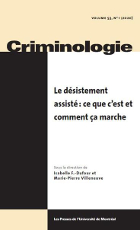
La revue Criminologie, fondée par Denis Szabo en 1968, présente principalement des résultats de recherche et s'adresse tant aux scientifiques qu’aux professionnels de la justice pénale. C’est une revue thématique répondant aux préoccupations et aux intérêts actuels des criminologues québécois et étrangers. Les thèmes abordés sont souvent pluridisciplinaires et la revue fait appel à des chercheurs de différentes disciplines : criminologues, sociologues, psychologues, juristes, etc. Elle est la seule revue de criminologie publiée en français en Amérique. Criminologie paraît grâce à des subventions du Conseil de recherches en sciences humaines du Canada et du Fonds québécois de la recherche sur la société et la culture. Prof. David Décary-Hétu assure la direction de la revue.
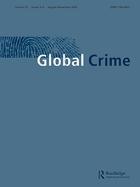
Prof. Gilles Favarel-Garrigues, Prof. Samuel Tanner et Prof. Daniel Trottier: Numéro spécial de Global Crime sur Watchful Citizens: Policing from Below and Digital Vigilantism
This special issue considers the emergence of digitally mediated vigilantism, particularly as a phenomenon that not only transcends any particular national context but also transcends the boundary between crime control and other aims such as entertainment and ideological advancement. We seek to provide an account of the emergence of digital vigilantism, highlighting pressing concerns with the study of this practice.
Monographies
Le corps professoral de l’École participe activement à l’avancement et au rayonnement des connaissances en criminologie, en sécurité intérieure et en études policières. Pour ce faire, les professeurs publient régulièrement des monographies. Vous trouverez ci-dessous une liste des plus récentes publications.
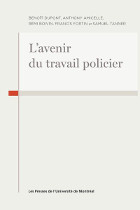
Anthony Amicelle, Prof. Benoit Dupont, Prof. Francis Fortin, Prof. Samuel Tanner: L'avenir du travail policier
Cet ouvrage tente de cerner les tendances sociales, technologiques ou économiques associées à l’avènement d’Internet et à la mondialisation des échanges qui transforment le travail policier. Il s’agit d’un portrait précis et exhaustif de cette mouvance qui influence et façonne irrémédiablement les pratiques professionnelles des institutions chargées de faire appliquer la loi et de garantir la sécurité des citoyens. À la fois bilan de ce qui est à retenir ou à rejeter et photographie des meilleures avenues pour penser l’avenir, on y aborde cinq thèmes, tous en relation avec la réalité du Canada : l’extrémisme violent, la cybercriminalité, les critères de mesure de l’efficacité du travail policier, les médias sociaux et enfin l’usage des algorithmes.
Ce collectif réunit cinq chercheurs de grande réputation qui analysent et documentent la nature de cette évolution sociétale sur les organisations policières dans un contexte technologique en perpétuel mouvement. Il s’adresse particulièrement aux chercheurs et aux étudiants en criminologie et en science politique, mais aussi aux politiques, aux gestionnaires policiers et aux journalistes qui couvrent les affaires criminelles ; enfin à tous ceux qui s’intéressent au fonctionnement de la police.
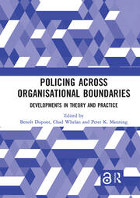
Prof. Benoît Dupont, Chad Whelan, Peter K. Mannin: Policing Across Organisational Boundaries: Developments in Theory and Practice
This book promotes new theoretical frameworks and research questions that seek to advance knowledge of policing across internal and external organisational boundaries, specifically at the structural level of analysis. It addresses police theory, policy and practice, and also provides new directions for future research on intra- and inter-organisational policing.
Analysing boundaries is of increasing global importance for policing policy and practice. Boundaries reflect the division-of-labour inherent to complex organisations and their specialist units. In order to operate effectively, however, these boundaries must be crossed, and strong and reliable linkages must be built. Intra-organisationally, it is vital to understand how specialist units form and function and interact with other units. Inter-organisationally, it is fundamental to recognise the place of boundaries in contexts such as international police cooperation.
Chapter 3 of this book is freely available as a downloadable Open Access PDF under a Creative Commons Attribution-Non Commercial-No Derivatives 3.0 license.
Chapter 4 of this book is freely available as a downloadable Open Access PDF under a Creative Commons Attribution-Non Commercial-No Derivatives 3.0 license.
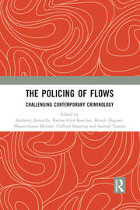
Anthony Amicelle, Prof. Karine Cote-Boucher, Prof. Benoît Dupont, Prof. Massimiliano Mulone, Clifford Shearing, Prof. Samuel Tanner: The Policing of Flows: Challenging Contemporary Criminology
Rectifying the fact that little criminological attention has been paid to the notion that the security of flows increasingly embodies concerns at the heart of contemporary policing practices, this book makes a significant contribution to knowledge about the policing and security governance of flows. The book focuses on how the growing centrality of flows affects both contemporary 'risks' and the policing organisations in charge of managing them. The contributors analyse flows such as event security; border controls and migration; the movement of animal parts; security-related intelligence; and organisational flows. The emerging criminology of these, as well as flows of money, information and numerous commodities, from pharmaceuticals to minerals or malicious software, is leading to critical advances in the understanding of the changing harm landscapes and the practices that have developed to manage them. Taken as a whole, the book opens up the conversation, and encourages the invention of new conceptual, theoretical and methodological tools to help criminology tackle and better understand the mobile world in which we live. This book was originally published as a special issue of Global Crime.
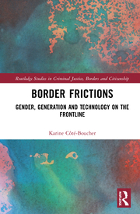
Prof. Karine Côté-Boucher: Border Frictions: Gender, Generation and Technology on the Frontline
How did Canadian border officers come to think of themselves as a "police of the border"? This book tells the story of the shift to law enforcement in Canadian border control. From the 1990s onward, it traces the transformation of a customs organization into a border-policing agency. Border Frictions investigates how considerable political efforts and state resources have made bordering a matter of security and trade facilitation best managed with surveillance technologies. Based on interviews with border officers, ethnographic work carried out in the vicinity of land border ports of entry and policy analysis, this book illuminates features seldom reviewed by critical border scholars. These include the fraught circulation of data, the role of unions in shaping the border policy agenda, the significance of professional socialization in the making of distinct generations of security workers and evidence of the masculinization of bordering. In a time when surveillance technologies track the mobilities of goods and people and push their control beyond and inside geopolitical borderlines, Côté-Boucher unpacks how we came to accept the idea that it is vital to deploy coercive bordering tactics at the land border. Written in a clear and engaging style, this book will appeal to students and scholars in criminology, sociology, social theory, politics, and geography and appeal to those interested in learning about the everyday reality of policing the border.
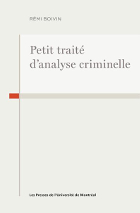
Prof. Rémi Boivin: Petit traité d'analyse criminelle
En présentant les grands principes de l’analyse criminelle, cet ouvrage vise un premier objectif : bénéficier du savoir des études menées depuis deux siècles qui ont permis des avancées notables et qu’il ne faudrait pas oublier. Dès le 19e siècle, en effet, on réalisait des travaux d’analyse criminelle pour répondre à la nécessité d’augmenter l’efficacité de la police dans sa lutte contre la criminalité. L’analyse criminelle est un travail complexe et sa formation doit en rendre compte. D’un côté, les analystes et, plus généralement, les criminologues se professionnalisent : il importe donc de bien définir en quoi consiste leur travail. C’est loin d’être facile, d’autant que la criminologie est elle-même un amalgame de domaines : géographie, psychologie, sociologie, travail social, droit, etc. D’un autre côté, il n’est pas évident de distinguer les analystes criminels des chercheurs en criminologie, puisqu’ils utilisent tous deux des méthodes et des processus semblables. Pourtant, tout comme les chercheurs sont considérés comme des « spécialistes en recherche », les analystes devraient être reconnus comme des experts en leur domaine. Cet ouvrage répondra à cet objectif de reconnaissance de la profession en en montrant toutes les facettes, de façon théorique, bien sûr, mais aussi en utilisant des exemples tirés de cas réels.
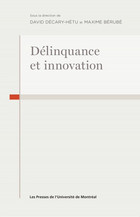
Prof. David Décary-Hétu et Maxime Bérubé: Délinquance et innovation
Associer l’innovation des délinquants aux développements technologiques récents peut être tentant. Pourtant, les criminels ont toujours su s’adapter à l’univers changeant des technologies pour mener à bien leurs forfaits. Nouveaux produits, nouveaux modes de production ou d’approvisionnement à exploiter, nouveaux marchés ou environnements à explorer : rien n’est à leur épreuve. Pour mieux comprendre ce phénomène d’adaptation de la délinquance, pour mieux le contrer et le prévenir, les acteurs de la sécurité doivent eux aussi faire preuve d’imagination et de créativité. Les auteurs brossent un portrait fouillé du tandem « délinquant-acteur de la sécurité », ici décortiqué dans toute sa complexité, sa richesse et ses contradictions. Ils montrent les usages des nouvelles technologies que ce tandem fait dans des domaines aussi divers que la déviance sexuelle, le terrorisme, la fraude bancaire, le trafic de stupéfiants ou encore l’invasion de domicile.

Prof. Quentin Rossy, Prof. David Décary-Hétu, Prof. Olivier Delémont et Prof. Massimiliano Mulone:The Routledge International Handbook of Forensic Intelligence and Criminology
Despite a shared focus on crime and its ‘extended family’, forensic scientists and criminologists tend to work in isolation rather than sharing the data, methods and knowledge that will broaden the understanding of the criminal phenomenon and its related subjects. Bringing together perspectives from international experts, this book explores the intersection between criminology and forensic science and considers how knowledge from both fields can contribute to a better understanding of crime and offer new directions in theory and methodology. This handbook is divided into three parts: Part I explores the epistemological and historical components of criminology and forensic science, focusing on their scientific and social origins. Part II considers how collaboration between these disciplines can bring about a better understanding of the organizations and institutions that react to crime, including the court, intelligence, prevention, crime scene investigation and policing. Part III discusses the phenomena and actors that produce crime, including a reflection on the methodological issues, challenges and rewards regarding the sharing of these two disciplines. The objective of this handbook is to stimulate a ‘new’ interdisciplinary take on the study of crime, to show how both forensic and criminological theories and knowledge can be combined to analyse crime problems and to open new methodological perspectives. It will be essential reading for students and researchers engaged with forensic science, criminology, criminal behaviour, criminal investigation, crime analysis and criminal justice.
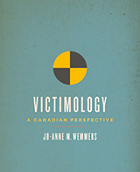
Prof. Jo-Anne Wemmers: Victimology: A Canadian Perspective
Victimology is a relatively new and emerging interdisciplinary area that crosses the fields of criminology, law, sociology, and justice. Written by one of the world’s leading experts on victimology, this book is designed to offer a broad introduction to the subject. Unlike other texts that are organized around different types of victimization, this book is informed by a victim-centered approach that treats victims’ rights as human rights.
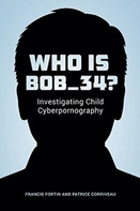
Prof. Francis Fortin et Prof. Patrice Corriveau: Who Is Bob_34?
Ce livre nous éclaire sur le monde clandestin de la pornographie juvénile en ligne et de la pédophilie. Que savons-nous exactement sur ces crimes? Qui produit la cyberpornographie? Qui la distribue? Qui la consomme? Et comment les consommateurs se rencontrent-ils? Pouvons-nous utiliser le profilage pour identifier les pédophiles en ligne? En collaborant avec d'autres auteurs sur le sujet et en obtenant des données empiriques originales issues de leur infiltration de groupes de consommateurs de pornographie juvénile, Prof. Fortin et Prof. Corriveau répondent à ces questions et ouvrent une fenêtre sur un phénomène contemporain qui est beaucoup plus complexe que les comptes rendus des médias et que les rapports officiels le suggèrent.